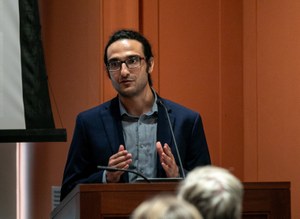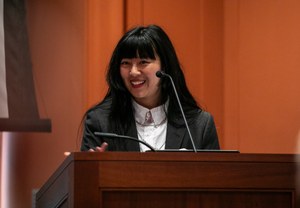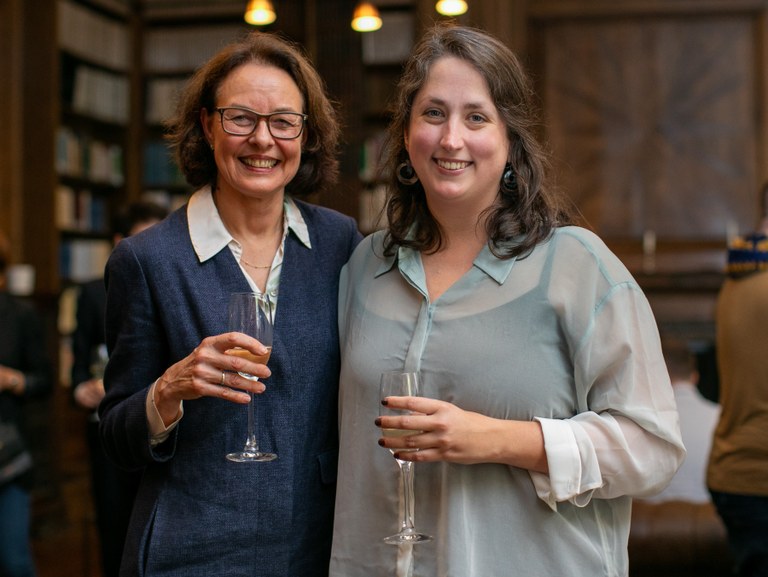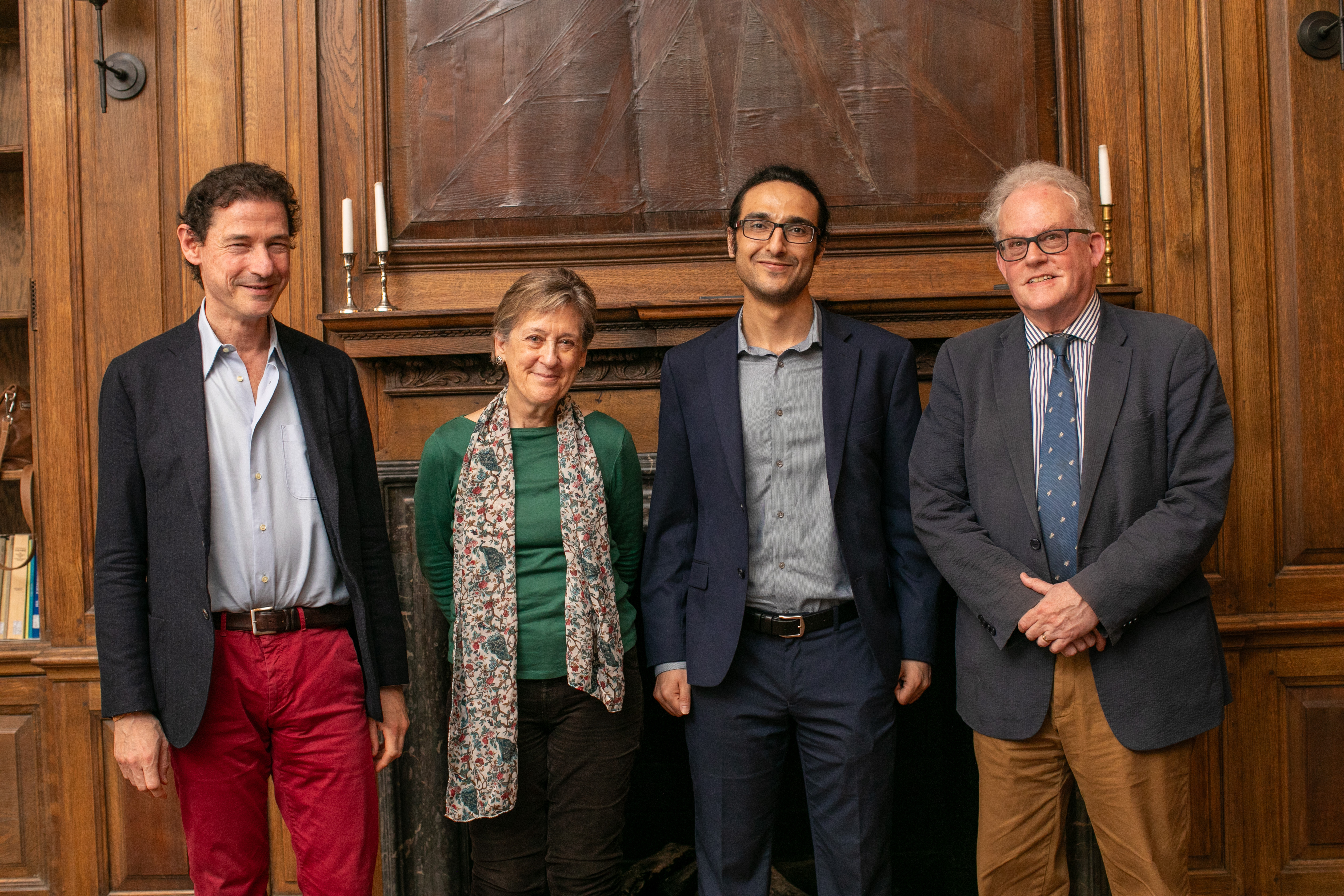ISAW COMMENCEMENT 2024
Three ISAW students were awarded doctoral degrees during the 2023-24 academic year: Alireza Khounani (April 2024), Yukina Z. Zhang (April 2024), and Kate Justement (May 2024). The ISAW community celebrated these students’ accomplishments at an in-person graduation ceremony and reception on May 14th, 2024, and at the NYU Graduate School of Arts and Science 2024 Doctoral Convocation at the Beacon Theatre on May 16th, 2024. We are extremely proud of ISAW’s May 2024 graduating class!
Our PhD Graduates
 Alireza Khounani earned his BA in Near Eastern Archaeology from Bu-Ali Sina University in Iran. Since then, his research has focused on the aftermath of Alexander’s conquests and the spread of Hellenism from southwest Anatolia to the Mediterranean, Near East and Central Asia. He received a scholarship in 2014 to study for an MA in Landscape Archaeology at Vrije Universiteit Amsterdam. At ISAW, Alireza continued his research on the factors involving the formation of the Arsacid Empire (e.g. religion, ideology of kingship and the role of local elites), and the significance of Hellenism which facilitated the emergence of the cultural blend found in the surviving evidence. Following his summer fellowship at New York’s American Numismatic Society, he extended his research to study economic life and monetization during the Seleucid and Arsacid periods.
Alireza Khounani earned his BA in Near Eastern Archaeology from Bu-Ali Sina University in Iran. Since then, his research has focused on the aftermath of Alexander’s conquests and the spread of Hellenism from southwest Anatolia to the Mediterranean, Near East and Central Asia. He received a scholarship in 2014 to study for an MA in Landscape Archaeology at Vrije Universiteit Amsterdam. At ISAW, Alireza continued his research on the factors involving the formation of the Arsacid Empire (e.g. religion, ideology of kingship and the role of local elites), and the significance of Hellenism which facilitated the emergence of the cultural blend found in the surviving evidence. Following his summer fellowship at New York’s American Numismatic Society, he extended his research to study economic life and monetization during the Seleucid and Arsacid periods.
Alireza’s ISAW doctoral dissertation, which he defended in April 2024, is entitled "Silver Drachms and Bronze Drachms: Currency Reforms of the Arsacid Empire (247 BCE–224 CE).” According to his advisor, Prof. Daniel Potts “While the best numismatists go far beyond a classificatory study of coins, and certainly understand the workings of the economies in which their coins circulated, not all have the broad cross-cultural understanding of ancient economies that Alireza has. Nor are all interested in the more theoretical and almost philosophical aspects of monetization and what changes in monetary practice and variability in weight standards tell us about the economic, social, and political history of ancient societies. Nor do all numismatists let alone archaeologists share the same diachronic, comparative perspective that characterizes Alireza’s work. Alireza is at home discussing Sumerian balanced accounts, Tacitus, Marcel Mauss, and John Maynard Keynes. He combines economic history, economic anthropology, numismatics, archaeology, and ancient history with a fluency and facility that appears effortless, but is anything but. Such an approach requires deep readings in many different disciplines, and this is the real hallmark of Alireza’s work. When we add to all of this, a mastery over the later pre-Islamic archaeology of Iran, and its epigraphic and literary sources, then I think it’s safe to say that there are very few scholars in the world today who control the material on which Alireza works with equal authority.”
 Yukina Z. Zhang graduated from Mount Holyoke College with a BA in Art History and a minor in Italian Studies and Classics. During her MA in Decorative Arts, Design History, and Material Culture at the Bard Graduate Center, she studied the visual and material culture of cross-cultural exchange between Eurasia and early imperial China. Her MA thesis examined the unique Eurasian design of hybrid animals with contorted body on horse frontlets in Western Han (206 B.C.-A.D.220) China, devoting particular focus to issues including the transmission of knowledge, and its transformation in the Western Han funerary context. Prior to her doctoral work at ISAW, she worked as a research associate in the Department of Asian Art at the Metropolitan Museum of Art for the special exhibition Age of Empires: Chinese Art of the Qin and Han Dynasties (221 B.C.-A.D. 220) on view in 2017.
Yukina Z. Zhang graduated from Mount Holyoke College with a BA in Art History and a minor in Italian Studies and Classics. During her MA in Decorative Arts, Design History, and Material Culture at the Bard Graduate Center, she studied the visual and material culture of cross-cultural exchange between Eurasia and early imperial China. Her MA thesis examined the unique Eurasian design of hybrid animals with contorted body on horse frontlets in Western Han (206 B.C.-A.D.220) China, devoting particular focus to issues including the transmission of knowledge, and its transformation in the Western Han funerary context. Prior to her doctoral work at ISAW, she worked as a research associate in the Department of Asian Art at the Metropolitan Museum of Art for the special exhibition Age of Empires: Chinese Art of the Qin and Han Dynasties (221 B.C.-A.D. 220) on view in 2017.
Yukina’s work at ISAW focused on the art and culture of the Tang Empire (A.D. 618-907) and Central Asia. Her dissertation took an interdisciplinary approach to examine the visual and material expressions from husband-and-wife joint burials around Chang'an, the cosmopolitan capital city of the Tang Empire, with a framework centered on gender, power, and art production.
Yukina’s doctoral dissertation, which she defended in April 2024, is entitled "Crafting Marriage in Afterlife: Art, Gender, and Power in Tang China, 618-907 C.E.” According to Prof. Sören Stark, Yukina’s dissertation “is an extremely rich study of husband-and-wife relationships at the mid-Tang court as expressed in funerary arrangements. While reading the final thesis two things became clear to me. First, I again realized what an amazing talent she has for looking closely at visual details, at special configurations, or at seemingly marginal details in tomb inventories. No doubt, she has honed this talent during years of study and hard work, but in her scholarly core, Yukina simply has this particular talent to see details that others have overlooked, and to instinctively know how they change the bigger picture. And second, Yukina is a superb narrator, so taken together, this makes the perfect combination for a most promising young art historian.”
This Fall, Yukina will begin a tenure track position as Assistant Professor of Art History and East Asian Studies at Davidson College.
 Kate Justement received a BA in History and Anthropology with a minor in Classics in 2015 at Auburn University. During her time at Auburn and after graduation she worked as an intern at the Smithsonian’s National Portrait Gallery and Archives of American Art as well as at the Metropolitan Museum of Art in the Islamic Art Department. While at the Met, her work with the Ernst Herzfeld papers and her research for her senior thesis on American archaeologist, William Arthur Shelton, influenced her interests in the art and archeology of the Near East and Anatolia during the second and first millennia BCE.
Kate Justement received a BA in History and Anthropology with a minor in Classics in 2015 at Auburn University. During her time at Auburn and after graduation she worked as an intern at the Smithsonian’s National Portrait Gallery and Archives of American Art as well as at the Metropolitan Museum of Art in the Islamic Art Department. While at the Met, her work with the Ernst Herzfeld papers and her research for her senior thesis on American archaeologist, William Arthur Shelton, influenced her interests in the art and archeology of the Near East and Anatolia during the second and first millennia BCE.
At ISAW, Kate specialized in the cultural history of northern Mesopotamia from the end of the Bronze through early Iron Ages, with a particular focus on the Assyrian empire, its material culture, and the social and political relationships of the various groups of people active during this time. While at ISAW she assisted with the ISAW exhibition A Wonder to Behold: Craftmanship and the Creation of Babylon’s Ishtar Gate in all aspects, including checklist management, provenance research, editing the catalogue, writing and editing didactics, creating digital materials, as well as outreach and programming. She also worked as graduate intern and project consultant at the Yale Babylonian Collection, assisting with the conceptualization of a new online search portal for the stamp and cylinder seals in the collection. During 2023-2024 she held a publications fellowship at the Getty Center in Los Angeles.
Kate’s doctoral dissertation, which she defended in May 2024, is entitled “Being an Assyrian Official: Agency and Group Formation in an Affective Network of People, Images, and Materials.” According to her advisor, Prof. Beate Pongratz-Leisten, “Kate’s entirely holistic approach and reassessment of the relationship between king and officials, combining text, archaeological record, and imagery alike, has resulted in two sophisticated case studies scrutinizing the particular distinct circumstances under which kings and officials operated in various locales of the empire.”
This fall, Kate will begin a position as Assistant Editor at the Princeton University Art Museum.

Left to right: Daniel Potts, Alireza Khounani, Sören Stark, Yukina Zhang, Beate Pongratz-Leisten, Kate Justement, Alexander Jones

Left to right: Gilles Bransbourg, Judith Lerner, Alireza Khounani, Daniel Potts

Antonis Kotsonas, ISAW Director of Graduate Studies, giving a toast.